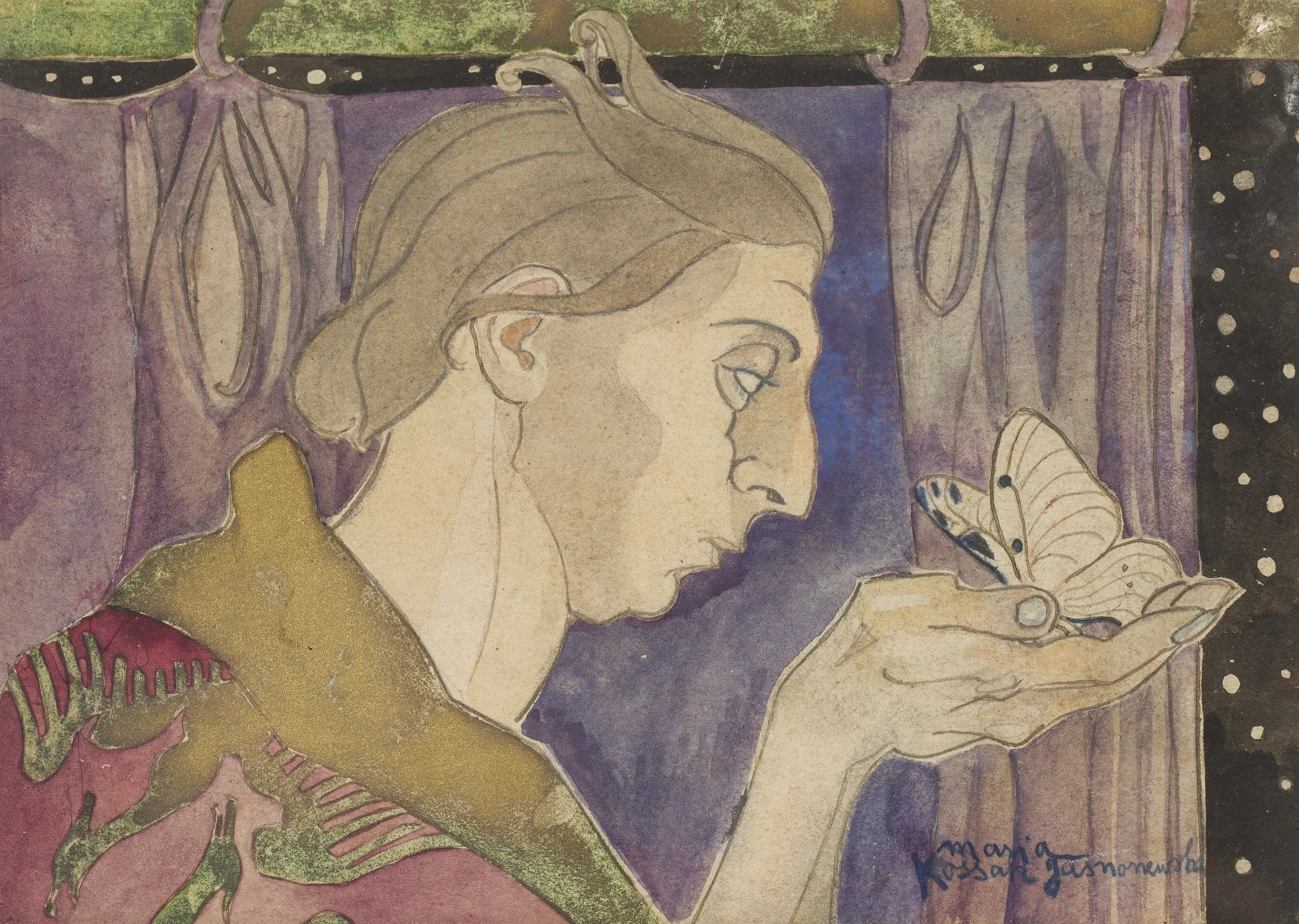Maria Pawlikowska-Jasnorzewska is mostly remembered for her poetry, but she also painted and wrote plays. One of her pieces is a fusion of both those arts.
A Portrait of Doom is a short radio play, first broadcast on Polish Radio on 18 February 1937. In this piece she looks back and gives us a uniquely witty sketch of Polish artistic life from the inside.
With its focus on an artist's family, A Portrait of Doom reflects MPJ's own experience as the daughter of Wojciech Kossak (1856 –1942) - growing up in a house stuffed with canvases, where there's no room even to sit down without getting paint on your dress. Her characters depend financially on portraits and commissions; they refer to the use of peasants as models in the countryside, and think about international fame (in America, which Wojciech Kossak visited in 1920, painting everything from farms to bankers).
The idea of the play, a variation on Wilde’s Portrait of Dorian Gray, is that the father’s portraits literally drain life out of his sitters, causing them to die. Not surprisingly when people realise this, they cancel their commissions and the unfortunate maestro (and his family) become desperate for money. In their arguments the artist’s family question the causative effect between the individuals’ portraits and their demise. They’re modern people, they equate such rumours with superstition. But when their daughter’s fiancé asks her father to paint her portrait, the decision whether ‘to paint or not to paint’ becomes a matter of life and death…
Though it's written so lightly and with such humour, the play is a debate about art in the early twentieth century. The painter-father here sees himself as the enemy of tradition but is terrified by new forms (Kossak has been described as a radical conservative: is the young 'Triangulist' a joke about Witkacy, who incidentally painted the portrait of Maria with the tear in her eye?).
MPJ asks, is 'realism' a matter of photographic reproduction? Is 'talent' about 'genius' or the ability to pay the bills? And centrally, she interrogates the sexual politics of painting: in a patriarchal culture, who sacrifices what for Art?
Last but not least, in this radio drama MPJ herself was embracing what was then the newest technology of all - playing with the paradox that here's a play about paintings that we cannot see, and experimenting with sound effects (a great deal is said about a 'spiral staircase' - because she cues the sound of footsteps, retreating, returning, and retreating again, ascending, sinking).
MPJ gives the key speech to the Mother, at the end. It’s focused on gender. In Wilde's Portrait of Dorian Grey aestheticism masked male moral corruption; in Pawlikowska-Jasnorzewska's Portrait of Doom we can hear the life draining out of a young woman, as her father reproduces her as Art.
Here’s a taster, two excerpts from the play:
MPJ on Painting: Two Conversations
THE CAST: August (the artist), Ada (his wife), Valeria (their daughter), Janek (her fiancé)
ONE
Ada Oh! It looks alive!
August Pah! That’s not the point! The story about the grapes Apelles painted - the Greek artist - remember?
Ada I do, yes. Apparently some sparrows pecked his painting. They thought the fruit was real.
August Exactly! And the whole story tells me one thing only: that that painting - artistically – was worthless. Just a moronic replication of nature.
Ada I’m not the expert – but in this portrait I don’t only see a likeness - there’s also a lot of soul. And a lot of - - - perspective?
August Sweetheart: you can think whatever you like, but don’t ever say a word about art.
Ada I love beauty, don’t I?
August Painting is not about beauty.
Ada Then what is it about?
August If I only knew!
TWO
August If you really want one, any other portrait painter will do it for you. One of the young ones, let them make a bit of cash! Kaszak for instance! Józef Marian Kaszak, the Triangulist. The one who sees the world as triangles. And calls me a philistine!
Janek You’re joking. I insist that only you can execute Val’s portrait. Val! Say something, back me up!
Valeria Daddy, why won’t you?
August Why? Because I don’t - - I’ve got no time.
Janek Only a second ago I heard something different. Please, I’m begging you! Only you can - - render her faithfully.
August (mockingly) ‘Render’,’ faithfully’! What an expression! Bravo!
Janek (enthusiastically) Full-length in a ball gown, with roses – no, even better - with a car! An ENTIRE car!
Portrait of Lilka by Witkacy

